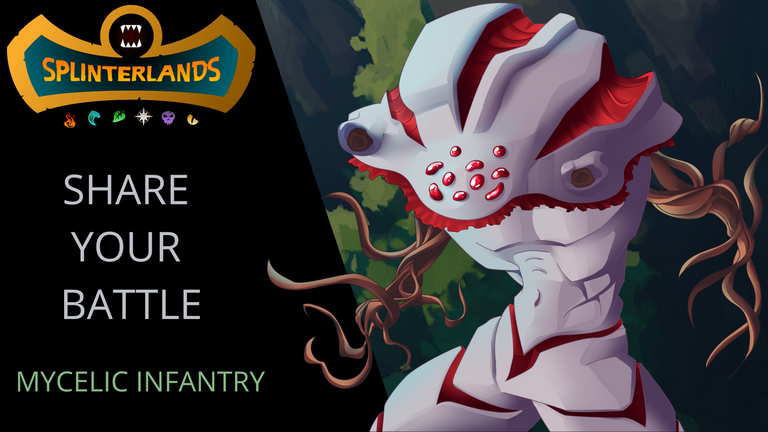
"Mycelic Infantry are lumbering behemoth fungus. They are the least intelligent of the Mycelia and are put on the front lines as a strong defense. They are incredibly tough but slow."
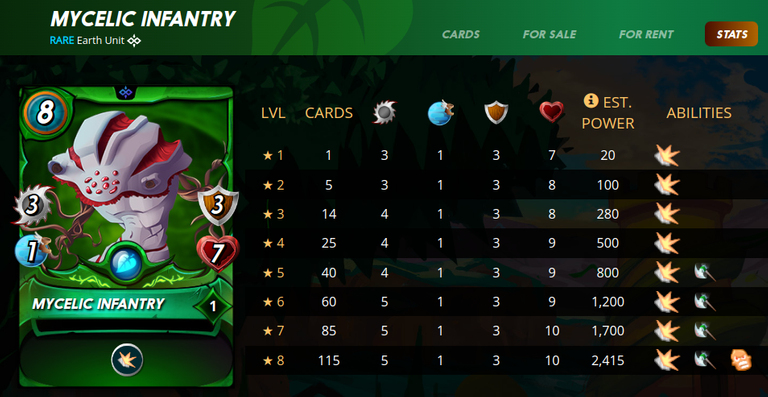
I only have level six Chaos Legion summoners so I should get my MyCelic Infantry to at least level six the same, but I've done fine with my level 3 so far. Max this guy out and it will come in handy when the slow go first and you're up against giants.
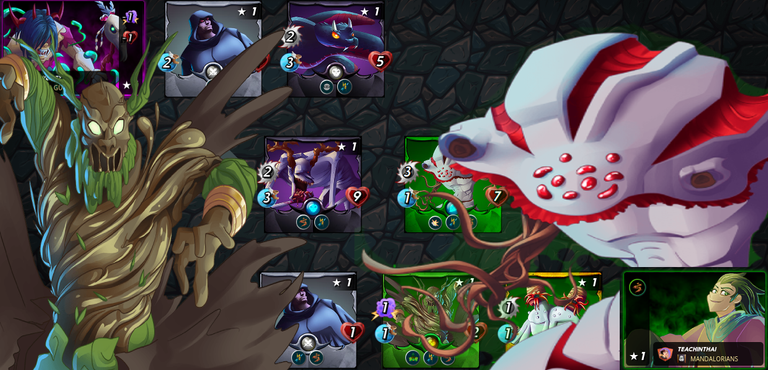
This was a simple low mana battle where we could afford about three cards each with tanks and secondary attackers and meat shields.
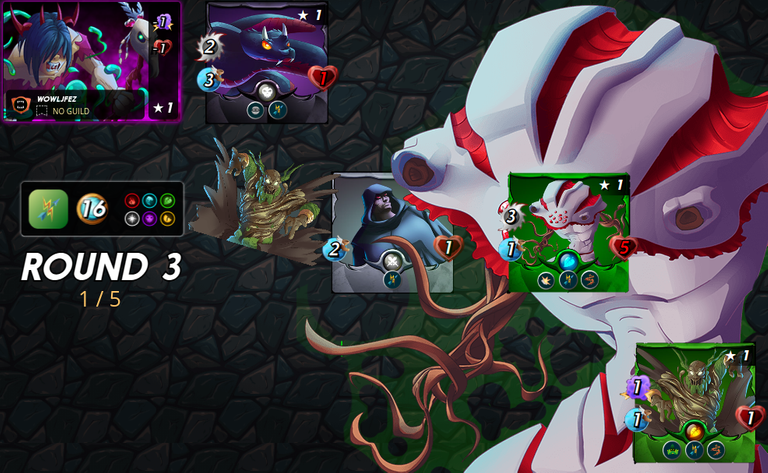
I was able to MAX a few Djinns for free from just gameplay rewards. It sure came in handy today. They couldn't kill it because they couldn't see it unless it was in the front position because it has the camouflage ability.
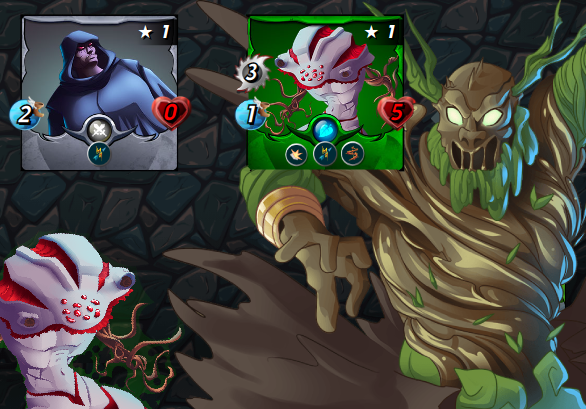
They took out her meatshield, but both the MyCelic inFantry and Djinn were left standing. I showed this Splinterlands Battle Challenge to my wife and asked her to let me know when she had a dramatic win with MyCelic. I'm truly happy she likes the game even more than me I just wish she wouldn't always play my capture rate down to 50%.
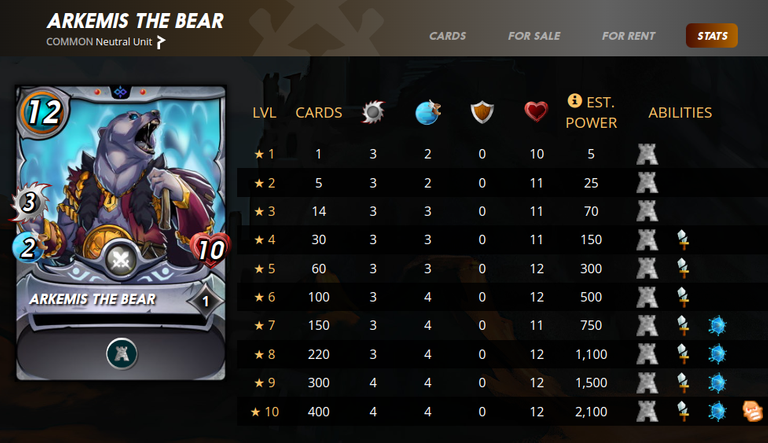
Did you get the end-of-the-year common promo card, Arkemis, The Bear, yet? He will come in handy when the slow go first or when melees can attack from any position. I've just leveled him up to level 2 so far. Hopefully, he gets cheaper. I'd like the get him up to level 8 one day because he'd have 12 life, halving, and a force field.
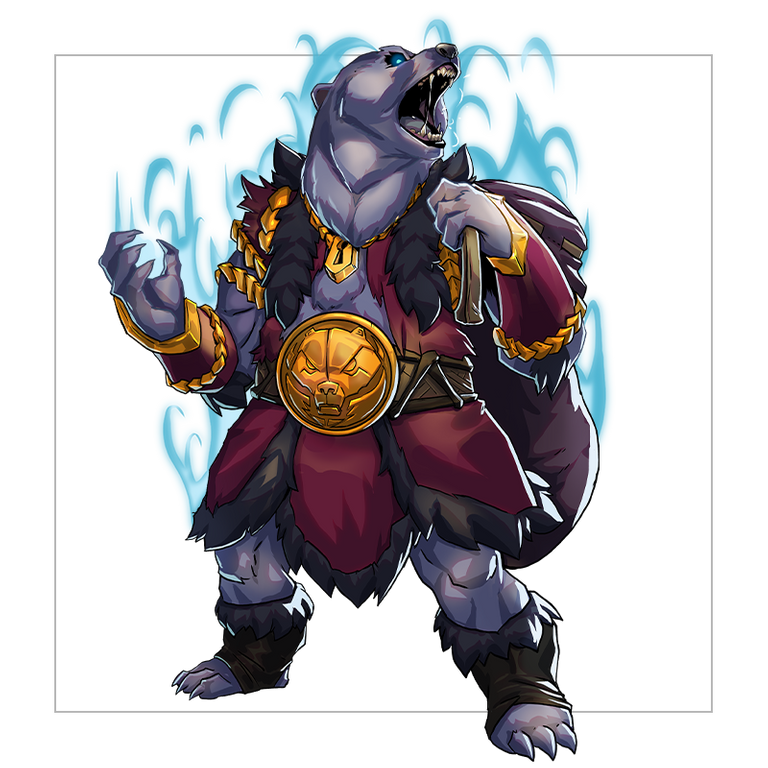
Arkemis the Bear
Sunrise and sunset, the seasons, the tides, the rise and fall of nations, birth, death, war, and regret. These things will come to pass. They are inevitable. So, too, is Arkemis, known throughout the Splinterlands as “The Bear.” In some cases, many years pass before The Bear’s coming. In others, only a few. It is never predictable, but it always comes. When it does, it is unfailingly presaged by calamity. Sometimes, it is a drought that grips the land. Crops wither and die, and famine follows. Sometimes, it is a disease or pestilence that strikes without regard for station or status, scourging nobles and commoners alike. Sometimes, it is strife and conflict sown in the name of religion, liberty, justice, pride, or principle. Nations are torn asunder, cities are set ablaze by civil war, and blood is spilled in the streets as kinsfolk beset one another. Sometimes, it is all of this and more. In turn, the price of goods and services collapses. Jobs are lost, and many find themselves on the streets. When these things come to pass, The Bear follows. It lumbers through the ruin its coming has wrought: the fields of dried husks, the empty streets, the derelict buildings, the emaciated corpses. It snuffles, growls, and roars as it scavenges on the suffering and sorrow of those trying to survive. Dark times grow darker still. Neighbors turn on neighbors, nobles forsake their subjects, and vassals curse their lords for not protecting them. On occasion, the very brave or the very foolish try to kill The Bear or intimidate and frighten it off. They soon learn, though, that neither steel nor spells can hurt it, and no matter how great the inferno or how mighty the army is, it cannot be stopped. One swipe of its terrible claws, both the very brave and the very foolish wind up very dead. Expecting the worst is yet to come (and very often it is), the people of the Splinterlands hoard what they need to survive and trade what they can for next to nothing in return, for they fear that it will all be worthless in the end. Their coins they bury in the dirt or stashed in some dark corner for safekeeping. Then they bolt their doors, batten their windows, and pray they will survive. At least, that is what most do. But not all. Once upon a time, there was a wise person named Yew Yosef. When the calamities struck and the village was gripped by drought, disease, discord, and economic ruin, Yew’s friends, neighbors, and family all believed it was The Bear that caused them. Yew, however, wondered. What if it was not The Bear that brought the calamities, but the calamities that brought The Bear? Perhaps it delivered not ruin but hope and opportunity in times of ruin. Throughout the summer, the skies remained barren of rain, and crops withered and wilted. In the fall, pestilence swept through the village, and after it had taken its pound of flesh, a great war took another. Winter came, and a blanket of white covered the land. The time of Winterfest drew ever nearer, but it brought neither celebrations nor revelers. Only the massive paw prints of The Bear blemished the snowy streets of the village and the outlying farms. As before when calamity struck, the people sold their valuables and buried their coins in the dirt. They bolted their doors, battened their windows, and prepared to wait out the long, cold winter. But instead of selling the plow, the gems and trinkets, and other valuables accumulated over the years, Yew kept them. Instead of butchering the reindeer for their tender steaks, Yew fed them a meager stock of grain. Instead of burying coins in the dirt, Yew invested them in the enterprises of neighbors with the promise that, when payment could be made, it would be made with interest. One stormy evening, with a thick flurry of snow falling from the sky, a thunderous roar resounded from outside Yew’s humble farmhouse. Yew’s family begged for the doors and windows to be locked. However, Yew tugged on a pair of leather boots, shrugged on a thick fur coat, grabbed a stocking hat, and stepped out into the storm. Visibility was next to nothing, and Yew squinted into the white, whirling tempest. From out of the curtain of snow, a dark sharp emerged. It was The Bear, a hulking beast larger than any Yew had ever seen. It lumbered across the field on all fours and stopped not twenty paces away. When it rose on its hind legs, Yew saw that it wore thick fur garments, a chain necklace, and a leather belt with a bear’s skull etched into its buckle. It peered down with black eyes dark with rage, yet they were not the eyes of a beast. Their tempestuous depths also held a keen intellect, ancient wisdom, and profound compassion. Its lips peeled back to reveal teeth long and sharp, and it let out another roar. Rather than turn and flee, Yew headed toward the barn, boots crunching in the snow. The Bear watched curiously but made no move to attack. Yew opened the door to the barn and led two reindeer outside. The Bear approached them and sniffed and snuffled, yet the reindeer did not cry out or bolt away in fear. Apparently satisfied, The Bear nodded once, and when it ambled off into the storm, the two reindeer followed. Several days later, The Bear returned. Again, Yew’s family begged for the doors and windows to be locked, and again Yew tugged on the boots, coat, and hat and stepped out into the storm. This time, Yew carried a burlap sack filled with gemstones and priceless trinkets and placed it in the snow before The Bear. The great beast sniffed and snuffled. Then it hefted the sack in one mammoth paw, slung it over a shoulder, and plodded off into the storm. The Bear continued to visit Yew, and Yew continued to give it gifts: more reindeer, gems, and trinkets, as well as coins, grain, farming tools, and other valuables. Each time, The Bear accepted its gifts and disappeared with them into the snow, leaving Yew and Yew’s family and farm unharmed. Winter marched ever onward, and The Bear came less and less often until it stopped coming altogether. Meanwhile, the pestilence had run its course. The great war had ended. On the eve of Winterfest, the sun hung high in a bright blue sky. The fields of Yew’s farm were damp with melted snow, and small green shoots sprouted from the damp soil. At last, the day dawned on Winterfest. The village people celebrated in the streets, exchanging gifts as they laughed and cried and hugged one another. Yew woke early, bundled up, and went outside. A great herd of reindeer filled the fields surrounding the farm. There were several hundred of them, and each carried a pair of satchels slung across its back. When Yew opened the satchels, they were filled with countless gems and coins, a hundredfold and a hundredfold more than had been given to The Bear. So, too, had the barn been stocked with new farming tools of the highest quality, and the storehouses were overflowing with grain. Erelong, Yew’s neighbors repaid him for his investment in their enterprises… with the interest of course. The tale of Yew’s good fortune spread far and wide. Across the Splinterlands, people swore that the next time The Bear came, they would do as Yew had done. Many years passed, and eventually, calamity befell the Splinterlands once again. The Bear followed, of course. It was inevitable. Yet many feared that this time, it would never leave, and the drought, disease, discord, and economic ruin would last forever. Once again, they sold their valuables and buried their coins in the dirt. When the calamities ended and The Bear left (as it always does), they found themselves worse off than they had been before. They turned to those who, like Yew, had embraced the coming of The Bear as a symbol of hope and an opportunity, and their hearts filled with envy. Instead of blaming their own foolish decisions and shortsightedness, they cursed their rotten luck. But as you know, when it comes to The Bear, we make our own luck.
- A Splinterlands Parable

This week's Splinterlands Battle Challenge:
https://peakd.com/hive-13323/@splinterlands/share-your-battle-weekly-challenge-mycelicinfantry
Check out her MyCelic inFANTRY battle:
https://splinterlands.com?p=battle&id=sl_7360428724596a53aaa0d8375e64ddc5&ref=teachinthai
Thanks for sharing! - @alokkumar121
